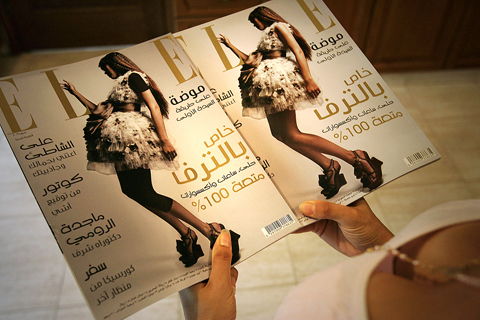France-based women’s magazines Elle and Marie-Claire are continuing a push into the Arab market, but say adapting content to local sensitivities without contradicting their own ideals is not easy.
Marie-Claire has editions in Kuwait and the United Arab Emirates (UAE) and last week launched a monthly in Saudi Arabia, where competitor Elle magazine is already present, as well as in Dubai and Lebanon.
But the just-released 35,000 copies of the Saudi edition of Marie-Claire ran into immediate, if minor problems. A story on Saudi women’s football, in which players are clad in trousers, long sleeves and headscarves, was allowed in full in Jeddah but not Riyadh.

PHOTO: AFP
“Our problem is reconciling local culture with the Marie-Claire concept, which is no piece of cake,” said Laurence Hembert Wermus, who heads international development for the magazine, a touch less glam than rival Elle.
“Given the economic context, there’s no point in launching new magazines in France, but publishers can develop editions internationally, and the Middle East is definitely a growth market,” said Sophie Renaud, who runs the media consultancy Carat France.
Yet in many of these new markets, it remains impossible to run photographs of naked women or stories on a gamut of sexual practices.
Last April, the French-language Africa newsweekly Jeune Afrique was banned in the UAE because of a cover picture showing a naked woman’s back to illustrate a feature story on “Muslims and Sex.”
So for these magazines that back feminist causes, taking root in the Arab world without negating their ideals is tricky.
“We are very careful not to provoke uselessly, we don’t want to be banned. It would neither help social progress nor the status of women,” said Jean de Boisdeffre, who heads the international media arm of Elle owner-company, Lagardere Active.
The magazine, for example, refrained from running a story on French President Nicolas Sarkozy’s call to ban the burqa.
Publication of pictures varies from country to country, said Marie Claire’s international editorial manager, Florence Duluard.
“In the Emirates we avoid pictures on the fashion pages of girls in very mini skirts or necklines that plunge to their navels. In Arabia it’s even stricter — no necklines and no knees.”
Both magazines have hired local journalists to provide content with a brief to highlight local designers and issues as well as the big-name fashion labels so popular in the Middle East.
“They know how to broach a subject,” Boisdeffre said, adding that 80 percent of the magazine was formulated in the region.
“We do talk about problems in couples or women who are depressed,” editorial manager Florence Duluard said. “But we never tackle these issues head-on — we take them on sideways, like asking ‘how to take a positive approach to the couple?’ instead of stating that a woman has problems because her husband doesn’t satisfy her.”

In the sweltering streets of Jakarta, buskers carry towering, hollow puppets and pass around a bucket for donations. Now, they fear becoming outlaws. City authorities said they would crack down on use of the sacred ondel-ondel puppets, which can stand as tall as a truck, and they are drafting legislation to remove what they view as a street nuisance. Performances featuring the puppets — originally used by Jakarta’s Betawi people to ward off evil spirits — would be allowed only at set events. The ban could leave many ondel-ondel buskers in Jakarta jobless. “I am confused and anxious. I fear getting raided or even

Kemal Ozdemir looked up at the bare peaks of Mount Cilo in Turkey’s Kurdish majority southeast. “There were glaciers 10 years ago,” he recalled under a cloudless sky. A mountain guide for 15 years, Ozdemir then turned toward the torrent carrying dozens of blocks of ice below a slope covered with grass and rocks — a sign of glacier loss being exacerbated by global warming. “You can see that there are quite a few pieces of glacier in the water right now ... the reason why the waterfalls flow lushly actually shows us how fast the ice is melting,” he said.

RISING RACISM: A Japanese group called on China to assure safety in the country, while the Chinese embassy in Tokyo urged action against a ‘surge in xenophobia’ A Japanese woman living in China was attacked and injured by a man in a subway station in Suzhou, China, Japanese media said, hours after two Chinese men were seriously injured in violence in Tokyo. The attacks on Thursday raised concern about xenophobic sentiment in China and Japan that have been blamed for assaults in both countries. It was the third attack involving Japanese living in China since last year. In the two previous cases in China, Chinese authorities have insisted they were isolated incidents. Japanese broadcaster NHK did not identify the woman injured in Suzhou by name, but, citing the Japanese

RESTRUCTURE: Myanmar’s military has ended emergency rule and announced plans for elections in December, but critics said the move aims to entrench junta control Myanmar’s military government announced on Thursday that it was ending the state of emergency declared after it seized power in 2021 and would restructure administrative bodies to prepare for the new election at the end of the year. However, the polls planned for an unspecified date in December face serious obstacles, including a civil war raging over most of the country and pledges by opponents of the military rule to derail the election because they believe it can be neither free nor fair. Under the restructuring, Myanmar’s junta chief Min Aung Hlaing is giving up two posts, but would stay at the